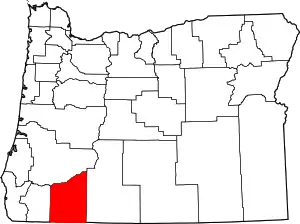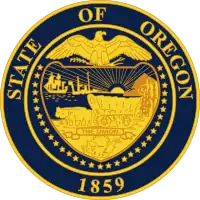Ashland, Oregon
Ashland is a city in Jackson County, Oregon, United States. It lies along Interstate 5 approximately 16 miles (26 km) north of the California border and near the south end of the Rogue Valley. The city's population was 20,078 at the 2010 census[7] and was estimated to be 21,281 as of 2019.[8]
Ashland, Oregon | |
|---|---|
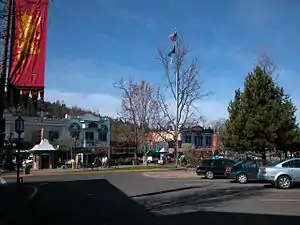 The Plaza | |
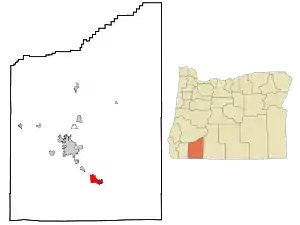 Location of Ashland in Jackson County and in the state of Oregon | |
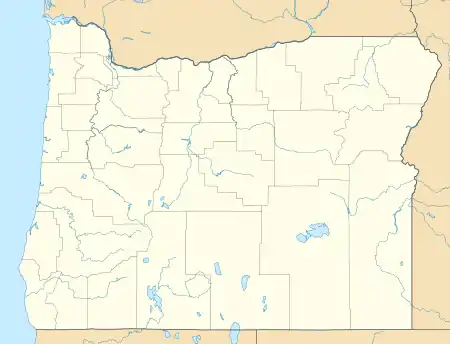 Ashland Location in Oregon  Ashland Ashland (the United States) 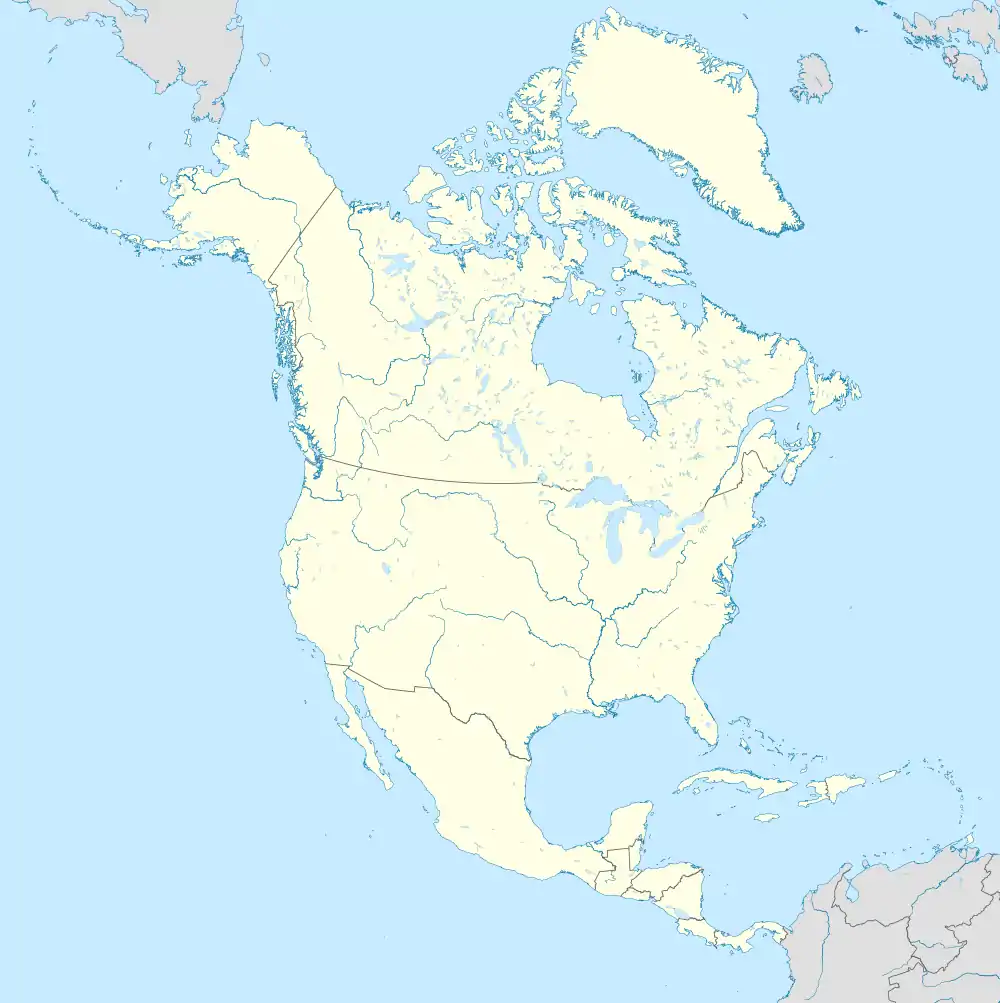 Ashland Ashland (North America) | |
| Coordinates: 42°11′29″N 122°42′03″W | |
| Country | United States |
| State | Oregon |
| County | Jackson |
| Settled | 1852 |
| Government | |
| • Mayor | Julie Akins[1] |
| Area | |
| • Total | 6.64 sq mi (17.19 km2) |
| • Land | 6.64 sq mi (17.19 km2) |
| • Water | 0.00 sq mi (0.00 km2) |
| Elevation | 1,949 ft (594 m) |
| Population | |
| • Total | 20,078 |
| • Estimate (2019)[5] | 21,281 |
| • Density | 3,206.90/sq mi (1,238.16/km2) |
| Time zone | UTC−8 (Pacific) |
| • Summer (DST) | UTC−7 (Pacific) |
| ZIP code | 97520 |
| Area code(s) | 541 and 458 |
| FIPS code | 41-03050[6] |
| GNIS feature ID | 1137318[3] |
| Website | www |
The city is the home of Southern Oregon University (SOU) and the Oregon Shakespeare Festival (OSF). These are important to Ashland's economy, which also depends on restaurants, galleries, and retail stores that cater to tourists. Lithia Park along Ashland Creek, historic buildings, and a paved intercity bike trail provide additional visitor attractions.
Ashland, originally called "Ashland Mills", was named after Ashland County, Ohio, the original home of founder Abel Helman, and secondarily for Ashland, Kentucky, where other founders had family connections. Ashland has a mayor-council government assisted by citizen committees. Historically, its liberal politics have differed, often sharply, with much of the rest of southwest Oregon.
History
Prior to the arrival of white settlers in mid-19th century, the Shasta people lived in the valley along Ashland Creek approximately where today's city is located.[9] Early Hudson's Bay Company hunters and trappers following the Siskiyou Trail passed through the site in the 1820s. In the late 1840s, mainly American settlers following the Applegate Trail began passing through the area. By the early 1850s, the Donation Land Claim Act brought many to the Rogue Valley and into conflict with its native people. These often violent clashes, known ultimately as the Rogue River Wars, continued until 1856.[9]
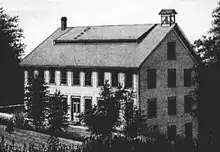
In 1851, gold was discovered at Rich Gulch, a tributary of Jackson Creek, and a tent city grew on its banks, today's Jacksonville.[10] Settlers arrived in the Ashland area in January 1852, including Robert B. Hargadine, Sylvester Pease, Abel D. Helman, Eber Emery, and others.[11] Helman and Hargadine filed the first donation land claims in Ashland.[11] Helman and Emery built a sawmill along what was then called Mill Creek to turn timber into lumber for settlers.[11] In 1854, they and another settler, M. B. Morris, built a second mill, Ashland Flouring Mills, to grind local wheat into flour. The community around the mill became known as "Ashland Mills". A post office was established in Ashland Mills in 1855 with Helman as postmaster.[11]
During the 1860s and 1870s the community grew, establishing a school, churches, businesses, and a large employer, Ashland Woolen Mills, which produced clothing and blankets from local wool. In 1871, the Post Office dropped "Mills" from Ashland's name. In 1872 Reverend J. H. Skidmore opened a college, Ashland Academy, a predecessor of Southern Oregon University.[12]
.jpg.webp)
In 1887, Portland, Oregon, and San Francisco, California, were joined by rail at Ashland. Until 1926, when most rail service began taking a different route (east through Klamath Falls to avoid the steep grade through the Siskiyou Mountains), Ashland thrived on rail trade of local products, including pears, peaches, and apples.[10]
In 1908 the Women's Civic Improvement Club petitioned for the creation of community space along Ashland Creek, which became Ashland Canyon Park. The discovery of lithia water near Emigrant Lake around the same time led to a plan to establish a mineral spa at the park. Voters approved bonds to pay for the project, which included piping the mineral water from its source to Ashland. The town engaged John McLaren, landscape architect of San Francisco's Golden Gate Park, to design the park, renamed Lithia Springs Park, later shortened to Lithia Park. Although the park was popular, the mineral spa plans proved too expensive for local taxpayers and were abandoned in 1916. Meanwhile, entrepreneurs took to bottling and selling mineral waters from the area's springs.[14]
During the Fourth of July celebration in 1935, Angus L. Bowmer arranged the first performances of what would become the Oregon Shakespeare Festival. The festival grew during the 20th century, and has become an award-winning and internationally known regional theater company.[15]
Many of Ashland's historic buildings have been preserved and restored. The city has 48 individual structures and two historic districts (the Ashland Railroad Addition District and the Downtown District) on the National Register of Historic Places.[16] The structures include the Enders Building (home of the Columbia Hotel), which from 1910 to 1928 contained the largest mercantile establishment between Sacramento and Portland.[17]
Geography
.jpg.webp)
Ashland is at 1,949 feet (594 m) above sea level[3] in the foothills of the Siskiyou and Cascade ranges, about 15 miles (24 km) north of the California border on Interstate 5 (I-5).[18] About 10 miles (16 km) south of Ashland and 5 miles (8 km) north of the California border is Siskiyou Summit, which at 4,310 feet (1,310 m) is the highest point on I-5.[19] Ashland is about 12 miles (19 km) southeast of Medford and 285 miles (459 km) south of Portland.[20] According to the United States Census Bureau, the city has a total area of about 6.6 square miles (17.1 km2), all land.[7]
Ashland Creek and its tributaries begin on the flanks of Mount Ashland, at 7,533 feet (2,296 m) above sea level in the Siskiyou Mountains south of the city. Upstream (south) of the city boundary, these streams flow mainly through the Rogue River–Siskiyou National Forest. The creek flows through the city to meet Bear Creek, which roughly parallels I-5 along the east side of Ashland. Bear Creek, one of many streams in the Rogue Valley,[21] flows generally northwest to join the Rogue River near Gold Hill, and from there the river flows generally west to its mouth on the Pacific Ocean.[21]
Oregon Route 99, running roughly parallel to I-5, passes through downtown Ashland. Oregon Route 66 enters Ashland from the east and intersects Route 99 near the city center.[21] Route 66 leads east 63 miles (101 km) to Klamath Falls.
Climate
Ashland lies within Oregon's southwest interior climate zone, in which all but the higher-elevation sites are in the rain shadow of the Oregon Coast Range to the west. The largest urban areas in this zone in addition to Ashland are Medford and Grants Pass in the Rogue Valley, and Roseburg in the Umpqua River Valley further north. Although the mountain peaks in this zone receive up to 120 inches or 3,050 millimetres of precipitation a year, the urban areas and the valleys in which they lie generally get 20 inches (510 mm) or less. This valley climate is particularly good for growing fruit, especially pears, and for producing other crops and farm goods such as hay, grain, poultry, and beef.[22]
Cloud cover in nearby Medford varies from an average of 21 percent in July to 86 percent in December.[23] On average, precipitation falls in Ashland on 114 days each year and totals about 20 inches (510 mm).[24] The average annual snowfall is only 1.4 inches or 0.04 metres.[24] The average relative humidity, measured at 4 p.m. daily, is 47 percent in Medford, varying from 26 percent in July to 76 percent in December.[25] According to the Köppen climate classification system, Ashland has a warm-summer Mediterranean climate (Csb).
The coolest month is December, with an average high temperature of 47 °F or 8.3 °C, and the warmest month is July, with an average high of about 88 °F or 31.1 °C.[24] The highest temperature ever recorded in Ashland was 108 °F (42.2 °C), observed in August 1981, and the record low of −4 °F (−20 °C) occurred in December 1972.[26] The wettest "rain year" has been from July 1926 to June 1927 with 29.77 inches (756.2 mm) and the driest from July 1954 to June 1955 with only 10.37 inches (263.4 mm). The wettest month on record has been December 1964 with 11.28 inches (286.5 mm), but the only other months with over 8 inches or 203.2 millimetres have been December 1996 with 10.89 inches (276.6 mm), November 1903 with 8.10 inches (205.7 mm) and November 1998 with 8.03 inches (204.0 mm).
| Climate data for Ashland, Oregon (1981–2010 normals) | |||||||||||||
|---|---|---|---|---|---|---|---|---|---|---|---|---|---|
| Month | Jan | Feb | Mar | Apr | May | Jun | Jul | Aug | Sep | Oct | Nov | Dec | Year |
| Record high °F (°C) | 71 (22) |
78 (26) |
82 (28) |
94 (34) |
101 (38) |
105 (41) |
106 (41) |
108 (42) |
103 (39) |
97 (36) |
80 (27) |
70 (21) |
108 (42) |
| Average high °F (°C) | 49.0 (9.4) |
54.0 (12.2) |
58.2 (14.6) |
63.3 (17.4) |
70.9 (21.6) |
78.8 (26.0) |
87.6 (30.9) |
87.1 (30.6) |
80.4 (26.9) |
68.3 (20.2) |
53.6 (12.0) |
47.4 (8.6) |
66.6 (19.2) |
| Daily mean °F (°C) | 39.4 (4.1) |
42.4 (5.8) |
45.5 (7.5) |
49.7 (9.8) |
56.2 (13.4) |
62.8 (17.1) |
69.4 (20.8) |
68.6 (20.3) |
62.0 (16.7) |
52.5 (11.4) |
43.0 (6.1) |
38.3 (3.5) |
52.5 (11.4) |
| Average low °F (°C) | 29.9 (−1.2) |
30.8 (−0.7) |
32.8 (0.4) |
36.1 (2.3) |
41.5 (5.3) |
46.7 (8.2) |
51.2 (10.7) |
50.0 (10.0) |
43.6 (6.4) |
36.7 (2.6) |
32.5 (0.3) |
29.2 (−1.6) |
38.4 (3.6) |
| Record low °F (°C) | −1 (−18) |
−1 (−18) |
15 (−9) |
20 (−7) |
23 (−5) |
29 (−2) |
32 (0) |
34 (1) |
27 (−3) |
13 (−11) |
12 (−11) |
−4 (−20) |
−4 (−20) |
| Average precipitation inches (mm) | 2.36 (60) |
1.88 (48) |
2.01 (51) |
1.80 (46) |
1.70 (43) |
0.79 (20) |
0.52 (13) |
0.54 (14) |
0.67 (17) |
1.39 (35) |
3.01 (76) |
3.28 (83) |
19.95 (506) |
| Average snowfall inches (cm) | 0.3 (0.76) |
0.4 (1.0) |
0.2 (0.51) |
0 (0) |
0 (0) |
0 (0) |
0 (0) |
0 (0) |
0 (0) |
0 (0) |
0 (0) |
0.5 (1.3) |
1.4 (3.57) |
| Average precipitation days (≥ 0.01 in) | 14.1 | 11.9 | 13.4 | 12.7 | 9.6 | 5.3 | 2.5 | 2.6 | 3.9 | 7.5 | 15.2 | 15.0 | 113.7 |
| Average snowy days (≥ 0.1 in) | 0.5 | 0.4 | 0.1 | 0 | 0 | 0 | 0 | 0 | 0 | 0 | 0 | 0.3 | 1.3 |
| Source: NOAA[24] | |||||||||||||
Demographics
| Historical population | |||
|---|---|---|---|
| Census | Pop. | %± | |
| 1860 | 327 | — | |
| 1870 | 400 | 22.3% | |
| 1880 | 842 | 110.5% | |
| 1890 | 1,784 | 111.9% | |
| 1900 | 2,634 | 47.6% | |
| 1910 | 5,020 | 90.6% | |
| 1920 | 4,283 | −14.7% | |
| 1930 | 4,544 | 6.1% | |
| 1940 | 4,744 | 4.4% | |
| 1950 | 7,739 | 63.1% | |
| 1960 | 9,119 | 17.8% | |
| 1970 | 12,342 | 35.3% | |
| 1980 | 14,943 | 21.1% | |
| 1990 | 16,234 | 8.6% | |
| 2000 | 19,522 | 20.3% | |
| 2010 | 20,078 | 2.8% | |
| 2019 (est.) | 21,281 | [5] | 6.0% |
| Census sources[4][27] | |||
In the census of 2010, there were 20,078 people, 9,409 households, and 4,542 families residing in the city. The population density was 3,047 inhabitants per square mile (1,176/km2). There were 10,455 housing units at an average density of 1,587 per square mile (613/km2). The racial makeup of the city was about 90% White, 1% African American, 1% Native American, 2% Asian, 0.3% Pacific Islander, 1.4% from other races, and 4% from two or more races. Hispanic or Latino of any race were about 5% of the population.[4]
There were 9,409 households, out of which about 21% had children under the age of 18 living with them. About 34% were married couples living together; 10% had a female householder with no husband present, about 4% had a male householder with no wife present, and about 52% were non-families. About 38% of all households were made up of individuals, and 13.5% had someone living alone who was 65 years of age or older. The average household size was 2.03 and the average family size was 2.63.[4]
The median age in the city was 42.9 years. About 16% of residents were under the age of 18, and about 16% were between the ages of 18 and 24. Rounded to the nearest whole number, 21% were from 25 to 44 years old; 30% were from 45 to 64; and 18% were 65 years of age or older. The gender makeup of the city was about 46% male and 54% female.[4]
In 2010, the median income for a household in the city was $41,334, and the median income for a family was $58,409. Males had a median income of $50,368 versus $34,202 for females. The per capita income for the city was $28,941. About 21% of the population and 13% of families had incomes below the poverty line. Out of the total population, about 30% of those under the age of 18 and 3.5% of those 65 and older were living below the poverty line.[4]
Government
Ashland has a mayor–council government consisting of a mayor and six council members elected by the city's voters to serve four-year terms.[28] Current mayor Julie Akins was elected to her first term in 2020.[1]
Pam Marsh, a Democrat from Ashland, represents Ashland and all of Oregon House District 5 in the state legislature.[29] As part of Oregon Senate District 3, Ashland is represented by Democrat Jeff Golden.[30] At the federal level, Cliff Bentz, a Republican, represents Ashland as part of Oregon's 2nd congressional district in the United States House of Representatives.[31] Ron Wyden and Jeff Merkley, both Democrats, serve the state of Oregon in the United States Senate.[30]
Historically, Ashland has been something of a political outlier in southwest Oregon.[32] In the presidential election of 1860, Ashland favored Abraham Lincoln while its neighbors strongly preferred pro-slavery candidates.[32] In the early 1900s, Ashland voters supported women's suffrage and prohibition, generally out of step with the rest of the region.[32] In more recent elections, liberal Ashland has supported tax levies and environmental regulations opposed by voters elsewhere in Jackson and nearby counties.[32] Critics sometimes refer to the city as the People's Republic of Ashland.[32]
Economy
Income from tourism is important to Ashland's economy. A large number of restaurants, galleries, and retail stores cater to thousands of visitors who attend plays each year at the Oregon Shakespeare Festival. In 2011, the festival sold more than 390,000 tickets to its theater productions.[33]
The town's largest employer is Southern Oregon University (SOU), which has a faculty and staff of more than 750.[33] In addition to the Oregon Shakespeare Festival and the university, health-service providers make significant contributions to the economy. Businesses related to outdoor recreation, transportation, technology, and light manufacturing are also important.[33] In 2010, the Shakespeare Festival employed about 500 people, the hospital about 400, the public schools about 300, and the City of Ashland about 250.[34] The Bathroom Readers' Press, which produces the Uncle John's Bathroom Reader books, is based in Ashland and San Diego.[35] Brammo, specializing in battery-electric motorcycles, was based in Ashland but moved to Talent.[36]
Arts and culture
_(jacDA0080).jpg.webp)
The Oregon Shakespeare Festival has grown from a summer outdoor series in the 1930s to a season that stretches from February to October, incorporating Shakespearean and non-Shakespearean plays at three theaters.[37] The OSF has become the largest regional repertory theater in the United States.[16]
The Oregon Cabaret Theater features musicals and comedy throughout the year.[38] Opened in 1986, the dinner theater occupies a former First Baptist Church built in Mission Revival style.[39] The Ashland Independent Film Festival, which shows international and domestic films of almost every genre, takes place each April in the Varsity Theatre downtown. About 90 films are shown during the five days of the festival.[40] In 2009, Ashland was the setting for the film adaptation of Neil Gaiman's Coraline.[41]
The Oregon Center for the Arts at Southern Oregon University focuses on academic programs including creative arts (art, emerging media and creative writing), music, and theatre. Affiliated with the center is the Schneider Museum of Art, which has rotation exhibitions of works featuring professional contemporary artists. Also affiliated with the center are chamber music concerts, a Shakespeare institute, a piano series, and other art-related events.[42]
The annual Ashland New Plays Festival (ANPF) is a nonprofit organization that encourages playwrights to develop new work through public readings. Each year, the ANPF holds an international competition that winnows hundreds of submissions to four plays that are read to live audiences by professional actors during a five-day festival in October.[43]
Museums and other points of interest
The National Fish and Wildlife Forensics Laboratory in Ashland is the world's only laboratory dedicated to solving crimes against wildlife. Using forensic science, experts at the laboratory help wildlife officers to investigate possible crimes against animals and to establish links between victims and suspects in cases that go to court.[44] The laboratory has assisted the International Criminal Police Organization (INTERPOL) and foreign agencies concerned with the Convention on International Trade in Endangered Species (CITES).[45]
The Ashland City Band (ACB) was organized in the late 19th century as the Ashland Brass Band.[46] The band used an octagonal gazebo-style bandstand in Lithia Park[47] until the Butler Memorial Band Shell was built in Lithia Park in 1946.[46] The ACB gives public concerts there each summer between June and August.[46]
Parks
.jpg.webp)
Lithia Park is a 93-acre (38 ha) park, including 42 acres (17 ha) on the National Register of Historic Places, that begins near the downtown shopping area and extends upstream along Ashland Creek near the center of the city.[48] It includes two ponds, a Japanese garden, tennis courts, two public greens, a bandshell (outdoor stage) and miles of hiking trails. The name Lithia comes from natural mineral water found in the Ashland area.[49] It has a strong mineral taste and slight effervescence, and the lithia water fountains found on the town plaza are frequently tasted by unsuspecting tourists (often at the behest of residents or frequent visitors who use the fountains as a cheap, humorous Ashland initiation rite).[50]
A hiking and biking path, the Bear Creek Greenway, begins in Ashland near the intersection of West Nevada Street with Helman Street,[51] close to the confluence of Ashland Creek (which flows through Lithia Park).[52][53] The 18-mile (29 km) path follows Bear Creek between Ashland and Central Point and passes through Talent, Phoenix, and Medford.[54]
Education
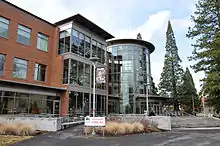
Southern Oregon University, a public co-ed four-year university founded in 1926, offers courses of study toward degrees in the liberal arts, science, business, and education. Students can focus on any of more than 30 major fields or enroll in programs such as Shakespeare Studies and other minors.[55] With an enrollment of about 6,200 undergraduates as of Fall 2014,[56] this urban university also offers graduate-level programs on its 175-acre (71 ha) campus.[55]
About 57 percent of the university's students are women, and about 43 percent are men. Their most popular major fields include those related to business, psychology, visual and performing arts, social sciences, and protective services such as law enforcement and firefighting. The student–faculty ratio in 2013–14 is 20 to 1. Tuition in 2013–14 is $7,863 per year for Oregon residents and $20,238 for all others.[55]
The Ashland School District oversees three elementary schools, one of which is a magnet school focused on science and the arts; one middle school; one high school; and a community learning center.[57] Ashland High School was ranked 1,395th best among the nation's public high schools and 15th best in Oregon by U.S. News & World Report as of 2013.[58]
Media
The Ashland Daily Tidings is published Monday through Saturday.[59] The Mail Tribune, a morning daily published Monday through Sunday in Medford, also serves Ashland.[59] Fifteen radio stations operate in the region around Ashland,[20] including Jefferson Public Radio[60] and KSKQ, an independent non-profit broadcasting at 89.5 FM.[61] A former student-run radio station with the call letters KSOC and the nickname "Radio Free Ashland" shut down in February 2013 after 14 years of broadcasting.[62] Rogue Valley Community Television, based at Southern Oregon University, serves Jackson and Josephine counties.[63] Ashland has no commercial television stations, but nearby Medford has seven.[64]
Infrastructure and public services
The Asante Ashland Community Hospital is a general medical and surgical hospital that is part of the Asante health network based in Medford. As of 2015, it has 49 inpatient beds.[65]
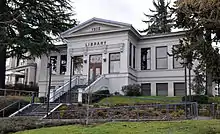
The Ashland Public Library building was expanded from the city's original Carnegie library.[66] In 2003, the historic Carnegie portion of the library was restored.[66] In 2006, budget problems led to the closing in April 2007 of the Ashland Library and 14 others in Jackson County. The event, which lasted until October 2007, was the largest library closure in U.S. history.[67] Although some of its services are handled by a private company, Library Systems and Services,[68] the Ashland branch remains part of the Jackson County network of public libraries.[66]
Rogue Valley Transportation District (RVTD) Route 10 provides bus service to much of the city.[69] Route 10 extends to Medford, where passengers can connect to other RVTD routes as well as to Southwest POINT, a daily shuttle operated by Klamath Shuttle carrying passengers between Brookings and the Amtrak station in Klamath Falls.[70] The Klamath Falls Amtrak Station serves the Coast Starlight long-haul passenger train on track owned by the Union Pacific Railroad.[71] Ashland Municipal Airport, with a 3,600-foot (1,100 m) asphalt runway, offers general aviation services.[72] Medford International Airport, 12 miles (19 km) from Ashland, also serves the city.[20]
The City of Ashland moved to improve local broadband Internet access in the late 1990s by creating the Ashland Fiber Network (AFN) and building a fiber optic ring inside the city boundaries.[34] However, by 2006 the city faced difficulties servicing AFN's debt load, which was approaching $15.5 million.[34] The city hired a new AFN director, Joe Franell,[73] who suggested scrapping cable television service while retaining the more profitable high-speed Internet access.[74] In October 2006, the cable television service was transferred to a local company, Ashland Home Net, while the City retained both the infrastructure and the wholesale Internet business.[75]
Notable people
- Harry Anderson (1952–2018), magician and TV actor[78]
- Les AuCoin (1942–), former congressman[79]
- Tai Babilonia (1959–), champion pairs figure skater[80]
- John Backus (1924–2007), computer scientist who created Fortran[81]
- Angus L. Bowmer (1904–1979), founder of the Oregon Shakespeare Festival[82]
- Erskine Caldwell (1903–1987), author, never lived in Ashland, but is buried there[83]
- Craig Chaquico (1954–), guitarist formerly with Jefferson Starship[84]
- Gretchen Corbett (1947–), actress, debuted as Desdemona at the OSF[85]
- Chad Cota (1971–), former National Football League player[86]
- Catherine E. Coulson (1943–2015), stage and screen actress[87]
- Alex Cox (1954–), film director[88]
- Ann Curry (1956–), former anchor on The Today Show[89]
- Ana Delfosse (1931–2017), Formula One mechanic and driver in Argentina; gas-station operator in Ashland[90]
- Alice DiMicele (1965–), musician[91]
- Jack Elam (1920–2003), actor[92]
- Gordon Fee (1934-), American-Canadian theologian
- David Fincher (1962–), film director[93]
- Gloria Greer (1908-1931), actress
- Johnny Gruelle (1880-1938), creator of Raggedy Ann and Raggedy Andy[94]
- Jeremy Guthrie (1979–), pitcher for the Kansas City Royals[95]
- Anthony Heald (1944–), television, film, and stage actor[96]
- Abel Helman (1824–1910), town founder[97]
- Frank C. High (1875–1966), Medal of Honor recipient for actions during the Philippine–American War[98]
- Gary "Chicken" Hirsh (1940–), former drummer for Country Joe and the Fish[99]
- Peter Hollens (1982–), independent a capella singer/songwriter[100]
- Jean Houston (1937–), author, lecturer, known for her work in human potentials, Mystery School and Social Artistry[101]
- Lawson Fusao Inada (1938–), Oregon Poet Laureate 2006–10, Professor Emeritus at Southern Oregon University[102]
- Dean Ing (1931–), author[103]
- Forrest Kline (1983–), musician[104]
- Otto Klum (1892–1944), football coach[105]
- Tonya Knight (1966–), bodybuilder, actress, model[106]
- Hal Koerner (1976–), ultramarathon runner, two-time winner of the Western States Endurance Run[107]
- Winona LaDuke (1959–), Native American activist and vice-presidential candidate for the Ralph Nader presidential campaign, 2000[108]
- Leonard Levy (1923–2006), Pulitzer Prize-winning historian[109]
- Rose Maddox (1925–1998), country-western musician[110]
- Steve Mason (1949–2005), "poet laureate" of the Vietnam Veterans of America[111]
- Vladimir Nabokov (1899–1977), author of Lolita[112]
- Mark Parent (1961–), former baseball player and currently bench coach for the Chicago White Sox[113]
- Alfred Peet (1920–2007), founder of Peet's Coffee & Tea[114]
- Jim Perry (1933–2015), television personality[115]
- Tucker Reed (1989-), blogger, author, journalist and activist
- Jeff Rense, talk-radio host[116]
- Ron Rezek (1946–), industrial designer and inventor[117]
- Sonny Sixkiller (1951–), former National Football League quarterback[118]
- Jon Micah Sumrall (1980–), lead singer of Christian rock band Kutless[119]
- Jerry Turner (1927–2004), stage designer and director[120]
- Larry Wagner (1907–2002), arranger and composer for Paul Whiteman and the Casa Loma Orchestra[121]
- Neale Donald Walsch (1943–), author of the Conversations with God series[122]
- Henry Woronicz (1954–), actor and director[123]
References
- "Incorporated Cities: Ashland". Oregon Blue Book. State of Oregon. Retrieved February 3, 2021.
- "2019 U.S. Gazetteer Files". United States Census Bureau. Archived from the original on October 17, 2020. Retrieved July 28, 2020.
- "Ashland". Geographic Names Information System. United States Geological Survey. November 28, 1980. Retrieved April 13, 2013.
- "U.S. Census website". U.S. Census Bureau. Archived from the original on December 27, 1996. Retrieved August 22, 2017.
- "Population and Housing Unit Estimates". United States Census Bureau. May 24, 2020. Archived from the original on April 21, 2019. Retrieved May 27, 2020.
- "Geographic Identifiers: Ashland City, Oregon". American FactFinder. U.S. Census Bureau. Archived from the original on February 12, 2020. Retrieved April 17, 2013.
- "Geographic Identifiers: 2010 Census Summary File 1 (G001): Ashland city, Oregon". American Factfinder. U.S. Census Bureau. Archived from the original on February 13, 2020. Retrieved October 19, 2018.
- "Population and Housing Unit Estimates". Archived from the original on April 21, 2019. Retrieved May 21, 2020.
- Davidson 1995, p. 137.
- "History of Ashland". City of Ashland. Archived from the original on July 20, 2011.
- Davidson 1995, pp. 138–41.
- Davidson 1995, pp. 142–44.
- "Ashland Oregon: From Stage Coach to Center Stage: Ashland Depot Hotel, South Wing". National Park Service. 2001. Archived from the original on June 28, 2012. Retrieved March 11, 2013.
- Davidson 1995, pp. 35–45.
- Peterson 2009, p. 93.
- "Ashland Oregon: From Stage Coach to Center Stage: Introduction". National Park Service. Archived from the original on July 24, 2012. Retrieved March 10, 2013.
- "Ashland, Oregon: From Stage Coach to Center Stage: Enders Building". National Park Service. Archived from the original on October 21, 2012. Retrieved March 9, 2013.
- The 2013 Road Atlas. Chicago: Rand McNally. 2013. p. 84. ISBN 978-0-528-00622-7.
- LaLande, Jeff. "Siskiyou Pass". The Oregon Encyclopedia. Portland State University. Archived from the original on May 21, 2014. Retrieved July 5, 2013.
- "Ashland Community Profile". Oregon Infrastructure Finance Authority. Archived from the original on July 1, 2014. Retrieved April 17, 2013.
- Oregon Atlas & Gazetteer (7th ed.). Yarmouth, Maine: DeLorme. 2008. pp. 58–61, 68–69. ISBN 978-0-89933-347-2.
- Taylor & Hannan 1999, p. 57.
- Taylor & Hannan 1999, p. 38.
- "NowData - NOAA Online Weather Data". National Oceanic and Atmospheric Administration. Archived from the original on September 5, 2015. Retrieved April 10, 2012.
- Taylor & Hannan 1999, p. 35.
- "Monthly Averages for Ashland, Oregon". The Weather Channel Interactive. Archived from the original on January 11, 2014. Retrieved April 18, 2013.
- Moffatt, Riley Moore (1996). Population History of Western U.S. Cities and Towns, 1850–1990. Lanham, Maryland: Scarecrow Press. p. 206. ISBN 978-0-8108-3033-2.
- "City Council". City of Ashland. Archived from the original on December 26, 2013. Retrieved December 24, 2013.
- "Your Government: Pam Marsh". The Oregonian. Portland, Oregon. 2017. Archived from the original on May 13, 2017. Retrieved May 12, 2017.
- "Your Government: Ashland". The Oregonian. Portland, Oregon. 2019. Archived from the original on December 25, 2013. Retrieved January 5, 2019.
- "Cliff Bentz". Ballotopedia. Archived from the original on November 1, 2020. Retrieved January 7, 2021.
- LaLande, Jeff. "Ashland". The Oregon Encyclopedia. Portland State University. Archived from the original on May 20, 2014. Retrieved December 25, 2013.
- "The Ashland Economy". Ashland Chamber of Commerce. 2011. Archived from the original on April 19, 2002. Retrieved February 22, 2013.
- "Ashland Fiber Network: Proposed 2010–2013 Strategic Business Plan" (PDF). City of Ashland. July 2010. pp. 10–13. Archived (PDF) from the original on December 26, 2013. Retrieved December 25, 2013.
- "About Us". The Bathroom Reader's Institute. 2013. Archived from the original on January 16, 2013. Retrieved January 25, 2013.
- "Company Overview of Brammo, Inc". Bloomberg Businessweek. Archived from the original on July 14, 2014. Retrieved April 16, 2014.
- Davidson 1995, pp. 11, 18.
- "The Cabaret Story (So Far)". Oregon Cabaret Theatre. Archived from the original on September 6, 2015. Retrieved August 17, 2015.
- Davidson 1995, p. 25.
- "About AIFF". Ashland Independent Film Festival. Archived from the original on September 5, 2015. Retrieved September 6, 2015.
- Wloszczyna, Susan (February 5, 2009). "Coraline Is the Perfect Young Heroine for Hard Times". USA Today. Archived from the original on June 30, 2014. Retrieved December 23, 2013.
- "Oregon Center for the Arts". Southern Oregon University. 2018. Archived from the original on March 23, 2019. Retrieved March 23, 2019.
- "About Us". Ashland New Plays Festival. February 5, 2013. Archived from the original on August 6, 2015. Retrieved August 17, 2015.
- "About the Laboratory". U.S. Fish and Wildlife Service. Archived from the original on December 24, 2013. Retrieved December 24, 2013.
- Davidson 1995, pp. 130–34.
- Davidson 1995, pp. 55–59.
- Graves, Kathy. "Ashland City Band: A Short History". Ashland City Band. Archived from the original on September 4, 2010. Retrieved July 11, 2010.
- "Lithia Park". National Park Service. Archived from the original on August 31, 2010. Retrieved July 15, 2010.
- O'Harra, Marjorie; Scriptor, Eldon (1986). Lithia Park. Ashland, Oregon: Ashland Parks and Recreation Department. OCLC 19118066.
- Miller, Bill (August 5, 2007). "A Drink of Water and a Puckered Face". Mail Tribune. Medford, Oregon. Archived from the original on June 10, 2011. Retrieved July 15, 2010.
- Aldous, Vickie (November 21, 2007). "City Council Approves 'Green' Subdivision". Ashland Daily Tidings. Archived from the original on December 24, 2013. Retrieved December 23, 2013.
- Drake, F.B., III (June 30, 2009). "Fowl Play: Water You Waiting For?". Ashland Daily Tidings. Archived from the original on September 28, 2011. Retrieved July 11, 2010.
- Aldous, Vickie (December 11, 2007). "Verde Village Offers Shades of Green". Ashland Daily Tidings. Archived from the original on December 24, 2013. Retrieved December 23, 2013.
- "Bear Creek Greenway Foundation". Bear Creek Greenway Foundation. Archived from the original on August 13, 2020. Retrieved May 3, 2020.
- "Southern Oregon University". U.S. News & World Report. 2013. Archived from the original on December 24, 2013. Retrieved December 26, 2013.
- "Fact Book 2014" (PDF). Southern Oregon University. p. 5. Archived from the original (PDF) on January 18, 2016. Retrieved September 7, 2015.
- "About the District". Ashland School District. Archived from the original on June 7, 2013. Retrieved February 19, 2013.
- "Ashland High School". U.S. News: Education. U.S. News & World Report. 2013. Archived from the original on December 24, 2013. Retrieved December 23, 2013.
- "Oregon Blue Book: Newspapers Published in Oregon". Oregon Secretary of State. 2013. Archived from the original on October 24, 2018. Retrieved December 18, 2013.
- "JPR: Jefferson Public Radio". Jefferson Public Radio. 2013. Archived from the original on December 4, 2013. Retrieved December 18, 2013.
- "KSKQ 89.5". Ashland Community Radio. Archived from the original on December 3, 2013. Retrieved December 18, 2013.
- Darling, John (February 4, 2013). "SOU's KSOC Radio Station Closes". Mail Tribune. Medford, Oregon. Archived from the original on December 19, 2013. Retrieved December 18, 2013.
- "About". Rogue Valley Community Television. 2013. Archived from the original on December 20, 2013. Retrieved December 18, 2013.
- "Oregon Commercial Television Stations". Oregon Blue Book. Oregon Secretary of State. 2013. Archived from the original on October 24, 2018. Retrieved December 25, 2013.
- "Welcome to Asante Ashland Community Hospital". Asante. 2015. Archived from the original on September 5, 2015. Retrieved June 4, 2015.
- "JCLS Ashland Library Branch". Jackson County Library Services. 2009. Archived from the original on February 12, 2013. Retrieved March 11, 2013.
- Batistella, Edwin (March 1, 2010). "BackTalk: What a Library Closure Taught Me". Library Journal. Archived from the original on June 12, 2012.
- Strand, Muriel (2011). "Public Library Privatization - A Case Study". League of Women Voters. Archived from the original on March 17, 2013. Retrieved September 15, 2012.
- "Bus Schedules and Route Maps" (PDF). Rogue Valley Transportation District. Archived (PDF) from the original on October 31, 2020. Retrieved July 10, 2017.
- "Southwest Point". Klamath Shuttle. 2008. Archived from the original on July 1, 2010. Retrieved July 14, 2010.
- "Klamath Falls, OR (KFS)". Great American Stations. Amtrak. Archived from the original on December 24, 2013. Retrieved December 23, 2013.
- "Airport Master Record: Ashland Muni Sumner Parker Field" (PDF). Federal Aviation Administration. 2012. Archived from the original on March 15, 2013. Retrieved April 13, 2013.
- Aldous, Vickie (March 9, 2006). "New AFN Director Approved". Ashland Daily Tidings. Archived from the original on December 24, 2013. Retrieved December 23, 2013.
- Aldous, Vickie (May 3, 2006). "City to Keep AFN, Dump TV". Ashland Daily Tidings. Archived from the original on July 22, 2009.
- Aldous, Vicky (October 20, 2006). "City Hands Over TV". Ashland Daily Tidings. Archived from the original on December 24, 2013. Retrieved July 11, 2010.
- "Guanajuato Room to be Dedicated". City of Ashland. June 7, 2004. Archived from the original on January 18, 2016. Retrieved September 6, 2015.
- "Ashland's Sister City". City of Ashland. Archived from the original on January 17, 2016. Retrieved March 24, 2011.
- Mail Tribune>Darling, John (April 18, 2018) "Ashland magician Harry Anderson went on to TV success". Archived from the original on 2018-04-19. Retrieved 2008-04-21.
- "AuCoin, Les". Biographical Directory of the United States Congress. United States Congress. Archived from the original on October 26, 2012. Retrieved August 17, 2015.
- "Tai Babilonia Hangs Up Her Skates in Ashland". The Oregonian. Portland, Oregon. Associated Press. November 23, 2008. Archived from the original on December 25, 2013. Retrieved December 24, 2013.
- Lohr, Steve (March 19, 2007). "John W. Backus, 82, Fortran Developer, Dies". The New York Times. Archived from the original on October 19, 2018. Retrieved December 24, 2013.
- "Our History". Oregon Shakespeare Festival. Archived from the original on April 23, 2015. Retrieved December 24, 2013.
- Turner, Kernan (September 3, 2010). "Novelist Erskine Caldwell's Ashes Rest in Ashland, Ore". Jefferson Public Radio. Archived from the original on May 24, 2013.
- Brennan, Sandra. "Craig Chaquico: Biography". Allmusic. Retrieved February 17, 2014.
- Erickson, Hal. "Gretchen Corbett: Full Biography". Movies & TV. The New York Times. Archived from the original on January 10, 2014. Retrieved December 24, 2013.
- "Chad Cota". ESPN. Archived from the original on December 26, 2013. Retrieved December 24, 2013.
- "Catherine E. Coulson". Internet Movie Database. Archived from the original on July 1, 2014. Retrieved May 6, 2014.
- Klotz, Frieda (June 13, 2011). "Director of 'Sid and Nancy' Talks About His New Job: Professor". The Chronicle of Higher Education. Washington, D.C. Archived from the original on December 26, 2013. Retrieved December 24, 2013.
- Max, Kevin (April 1, 2012). "Top 5 Things Ann Curry Loves About Oregon". 1859. Bend, Oregon: Deschutes Media. Archived from the original on December 25, 2013. Retrieved December 24, 2013.
- Eastman, Janet (June 5, 2017). "Race Car Driver Ana Delfosse, Who Broke Speed Records and Social Barriers, Remembered by Ashland Friends (Photos)". The Oregonian. Advance Digital. Archived from the original on June 4, 2017. Retrieved June 8, 2017 – via Oregon Live.
- Mokma, Deborah (March 1998). "Demons & Angels". The Sentient Times. Alice DiMicele. Archived from the original on December 25, 2013. Retrieved December 25, 2013.
- McCormack, Tiffany. "Jack Elam (1920–2003)". The Oregon Encyclopedia. Portland State University. Archived from the original on May 21, 2014. Retrieved December 25, 2013.
- Marx, Rebecca Flint. "David Fincher: Full Biography". Movies & TV. The New York Times. Archived from the original on January 14, 2014. Retrieved December 25, 2013.
- "Raggedy Ann in Ashland by Dawna Curler". As It Was Master Script List, Southern Oregon Historical Society. Archived from the original on September 28, 2007. Retrieved November 5, 2008.
- "Guthrie to Help Fund Ashland Prep Field". Mail Tribune. Medford, Oregon. October 26, 2013. Archived from the original on December 26, 2013. Retrieved December 25, 2013.
- Hughley, Marty (June 5, 2010). "Seasoned by Broadway and Hollywood, actor Anthony Heald reaches new peaks at the Oregon Shakespeare Festival". The Oregonian. Portland, Oregon. Archived from the original on January 18, 2013. Retrieved December 25, 2013.
- "Applegate Trail Settlement". National Park Service. Archived from the original on October 30, 2013. Retrieved December 25, 2013.
- "Since You Asked: Decorated Soldier Was in the Volunteer Infantry". Mail Tribune. Medford, Oregon. May 9, 2009. Archived from the original on November 18, 2016. Retrieved December 26, 2013.
- Eder, Bruce. "Gary "Chicken" Hirsh". AllMusic. Archived from the original on December 1, 2013. Retrieved December 26, 2013.
- Hollens, Peter. "Peter Hollens A Cappella Vocalist Producer Eugene Oregon Arranging Mixing On The Rocks". Peter Hollens Music. Archived from the original on March 21, 2014. Retrieved February 17, 2014.
- Houston, Jean. "Home of Jean Houston - Ashland, Oregon". Jean Houston Foundation. Archived from the original on June 29, 2014. Retrieved December 26, 2013.
- Wixon, Vincent. "Lawson Fusao Inada (1938-)". The Oregon Encyclopedia. Portland State University. Archived from the original on May 21, 2014. Retrieved December 26, 2013.
- "Dean Ing". Macmillan Publishers. Archived from the original on December 27, 2013. Retrieved December 26, 2013.
- Kahen-kashi, David (September 19, 2013). "Q&A: Forrest Kline of Hellogoodbye". The Eagle. Washington, D.C. Archived from the original on December 27, 2013. Retrieved December 26, 2013.
- "'Proc' Klum Dies of Heart Attack". Berkeley Daily Gazette. United Press. September 25, 1944. p. 11. Archived from the original on January 31, 2021. Retrieved December 26, 2013.
- "Tonya Knight". Metacritic. CBS Interactive. Archived from the original on January 17, 2016. Retrieved June 16, 2014.
- Mordhorst, Todd (June 27, 2009). "Koerner's Repeat Worth the Wait". The Folsom Telegraph. Folsom, California: Gold Country Media. Archived from the original on July 1, 2014. Retrieved December 26, 2013.
- Ritter, Peter (October 11, 2000). "Party Crasher". City Pages News: Minneapolis. Minneapolis, Minnesota: City Pages LLC. p. 3. Archived from the original on December 27, 2013. Retrieved December 26, 2013.
- "Southern Oregon University - Faculty 2000-2001". Southern Oregon University. Archived from the original on June 9, 2007.
- Ratliff, Ben (April 18, 1998). "Rose Maddox, 72, Country Singer of the '40s". The New York Times. Archived from the original on January 15, 2014. Retrieved December 26, 2013.
- "Steve Mason, 65, Had Been Battling Cancer". Mail Tribune. Medford, Oregon. May 27, 2005. Archived from the original on December 27, 2013. Retrieved December 26, 2013.
- Guzik, Hannah (July 29, 2010). "A Literary Giant's Love of Butterflies". Mail Tribune. Medford, Oregon. Archived from the original on December 27, 2013. Retrieved December 26, 2013.
- "Mark Parent Stats". Baseball Almanac. Archived from the original on December 5, 2013. Retrieved December 26, 2013.
- Marshall, Carolyn (September 3, 2007). "Alfred H. Peet, 87, Dies; Leader of a Coffee Revolution". The New York Times. Archived from the original on April 23, 2018. Retrieved December 26, 2013.
- Darling, John (November 25, 2015). "Former TV Game-Show Host Jim Perry Dies". Mail-Tribune. Medford, Oregon. Archived from the original on April 23, 2018. Retrieved April 23, 2018.
- Smith, James L. (April 27, 2015). "Used Canard Salesman". Southern Poverty Law Center. Archived from the original on August 18, 2017. Retrieved August 17, 2017.
- Scelfo, Julie (August 5, 2009). "Shopping With Ron Rezek: Fans That Look Cool". The New York Times. p. D4. Archived from the original on April 23, 2018. Retrieved December 26, 2013.
- Blount, Roy, Jr. (October 4, 1971). "The Magic Number Is Sixkiller". Sports Illustrated. Time, Inc. Archived from the original on December 28, 2013. Retrieved December 26, 2013.
- Wolf, Carissa (September 23, 2003). "Christian Rockers Confronting the Maladies of Life". The Idaho Statesman. p. 18. Archived from the original on January 31, 2021. Retrieved December 29, 2016 – via News Bank.
- Rourke, Mary (September 21, 2004). "Jerry Turner, 76; Led Oregon Shakespeare Festival to New Heights". Los Angeles Times. Archived from the original on December 29, 2013. Retrieved December 26, 2013.
- Rayno, Don (2012). Paul Whiteman: Pioneer in American Music, 1930-1967. Scarecrow Press. p. 493. ISBN 978-0-8108-8322-2. Retrieved April 15, 2014.
- Varble, Bill (September 14, 1997). "Former Rogue Valley Radio Host Finds Success in Conversations with God". Mail Tribune. Medford, Oregon. Archived from the original on December 27, 2013. Retrieved December 26, 2013.
- Shirley, Don (February 2, 1997). "Trading In a Desk for Footlights". Los Angeles Times. Archived from the original on December 29, 2013. Retrieved December 26, 2013.
Works cited
- Davidson, Janelle (1995). Ashland: An Oregon Oasis. Medford, Oregon: Webb Research Group Publishers. ISBN 0-936738-89-8.
- Peterson, Joe (2009). Images of America: Ashland. Charleston, South Carolina: Arcadia Publishing. ISBN 978-0-7385-7102-7.
- Taylor, George H.; Hannan, Chris (1999). The Climate of Oregon: From Rain Forest to Desert. Corvallis: Oregon State University Press. ISBN 978-0-87071-468-9.
External links
| Wikimedia Commons has media related to Ashland, Oregon. |
| Wikivoyage has a travel guide for Ashland, Oregon. |
